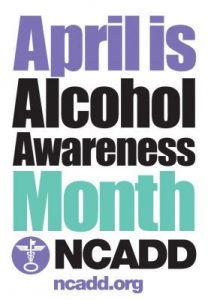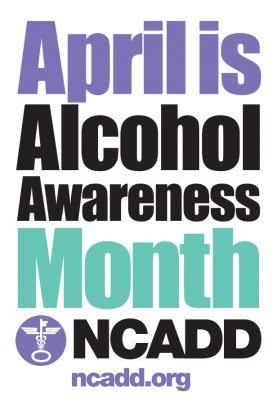 April has been designated as Alcohol Awareness Month by the National Council on Alcoholism and Drug Dependence, Inc. (http://www.ncadd.org/). The primary goals of this program are to make us aware of the dangers of alcohol use disorder (AUD), to help those who already suffer from AUD to recognize the problems being caused by excessive alcohol consumption, and the need to make life changes to arrest the process.
April has been designated as Alcohol Awareness Month by the National Council on Alcoholism and Drug Dependence, Inc. (http://www.ncadd.org/). The primary goals of this program are to make us aware of the dangers of alcohol use disorder (AUD), to help those who already suffer from AUD to recognize the problems being caused by excessive alcohol consumption, and the need to make life changes to arrest the process.
My primary focus is on the awareness by those who are already having problems with alcohol and their families. This process of awareness in the arena of AUD is often called the Stages of Change; a process first discussed by Prochaska & DiClemente in 1983. The stages include: pre-contemplation, contemplation, preparation, action, and maintenance. Some include relapse as a stage and some consider that to just be an interruption in the stages. The length and severity of the relapse determines if a person needs to start back at the beginning or can pick up where he or she left off.
I would like to bring this discussion to how families utilize the Stages of Change. In families so affected, the person having a problem with alcohol consumption might be a spouse or partner, child or sibling, or parent. I will refer to this person as the Loved One, because, after all, the reason we care about his or her consumption is because we do love and care for them. We should keep in mind that both the Loved One and the family will progress through the Stages of Change. Family members (and friends) also need to build awareness and work toward making changes.
Pre-contemplation is a period of time when the Loved One does not recognize that there is a problem. They do not see that their consumption might be causing any problems, even if they are suffering some consequences from their use. Pre-contemplation for a family member would include that the family does not recognize that there is any problem with alcohol and don’t see the part they play in the process.
Contemplation is the awakening of awareness that a problem might exist. The Loved One may begin to wonder if they are drinking too much but they are not willing to do anything about it, at least not now. They might be sitting on the fence about taking any action and may consider reduction or abstinence “in the future”. Contemplation for a family member is also recognition that something is not quite right and that there might be something skewed in the way the family is functioning. Maintaining the status quo becomes more and more difficult, but the family usually believes the fault lies exclusively with the Loved One who can’t control their drinking.
Preparation is the stage where our Loved One knows that a change must be made but is just starting to test the waters in the here and now. We might hear statements like “I may need to cut back my drinking or only drink beer.” “Maybe I should give it up for a while.” “I’ll try giving it up next month.” This is a necessary step for our Loved One to take. They need to see that doing what they are doing is no longer working and that while they are not yet ready to make a change, they see that change is going to be necessary. Preparation for a family is acknowledging that the way they are interacting with their Loved One is not healthy. They may start to see that they are enabling the alcoholic behavior or they don’t know how to change and they are afraid to do anything that will upset the apple cart. Everyone is walking around the proverbial purple elephant on the sofa.
Action occurs when the Loved One begins the process of recovery. For some, that might mean Harm Reduction — still drinking, but undergoing a structured process to decrease the consumption over a period of time. This is done with a plan, not just willy nilly. Other Loved Ones may begin to attend recovery meetings of one type or another and make a plan for maintaining sobriety, which might include therapy and/or support groups.
Still again, a Loved One’s use might be significant enough that they need more structured support to become sober, such as in-patient or out-patient rehabilitation treatment. This process of early sobriety will likely last at least 3-6 months and may last up to a year. For families, this is where the decision occurs to work in conjunction with the Loved One.
The family members recognize that they too must make changes in the way they have been living to become healthy themselves. This might include attending group or family therapy, or support groups such as Alanon and Alateen. This might also include attending a structured program such as the Be A Loving Mirror (BALM) program offered through Family Recovery Resources (www.familyrecoveryresources.com) and working with a family recovery life coach trained in the BALM method. Just as with the Loved One, for strong recovery to take hold, it is necessary for the family to practice living without co-dependency for about a year.
Maintenance is when the Loved One has established the program of recovery. It includes the first 5 years of living a sober lifestyle or as Alcoholics Anonymous describes it “living life on life’s terms.” Many therapists use the 5 year period as a guide to the development of a strong program of recovery because relapse usually happens more frequently in early sobriety. And there is evidence to indicate that it does take quite a long time for the psychological dependence on alcohol to dissipate.
For the family members, ongoing connection to families similarly situated is very important. Just as a Loved One needs to surround him or herself with others who are working hard to maintain recovery, the families need to also know that they are not alone and have others to help support them on those days when recovery is very hard. Organizations such Alanon and Alateen are very helpful to long term recovery for family members but there are other groups as well.
It is important to also talk a bit about relapse. It is a topic that raises a great deal of discussion among our Loved Ones. Some are of the opinion that relapse is a part of recovery. Some are of the opinion that relapse is not necessary. The point to make is that relapse can occur at any stage. If a relapse is short and not significant, the Loved One may be able to jump right back into the stage where it occurred without too much difficulty.
However, many who relapse begin with mental relapse, including pre-contemplation thoughts such as, “Maybe I’m not really an alcoholic.” “Maybe I can drink safely now that I have been sober for a while.” This kind of relapse usually lasts much longer and is often more severe, with the Loved One hitting an even lower bottom than they had previously. The most important thing to remember is that recovery is still possible and there is no reason that our Loved One can’t begin again with the initial stages of change.
It is also possible for family members to relapse. It usually happens in conjunction with a Loved One’s relapse and we retreat to our old behaviors because they are still comfortable. If the family relapses, it can also recover and depending on the length of the relapse, may be able to get back into the program of recovery without a serious lapse.
Recently, I came across a book written by Portia Nelson, called “There’s a Hole in my Sidewalk.” That book includes a poem called “An Autobiography in Five Short Chapters.” I thought it provided some insight into these stages of change and I am providing it here for your consideration.
Chapter One
I walk down the street.
There is a deep hole in the sidewalk.
I fall in.
I am lost . . . I am helpless.
It isn’t my fault . . .
It takes forever to find a way out.
Chapter Two
I walk down the same street.
There is a deep hole in the sidewalk.
I pretend I don’t see it.
I fall in again.
I can’t believe I am in this same place.
But it isn’t my fault.
It still takes a long time to get out.
Chapter Three
I walk down the same street.
There is a deep hole in the sidewalk.
I see it there.
I still fall . . . it’s a habit . . . but,
My eyes are open.
I know where I am.
It is my fault.
I get out immediately.
Chapter Four
I walk down the same street.
There is a deep hole in the sidewalk.
I walk around it.
Chapter Five
I walk down another street.
*Nelson, Portia (2012). There’s a Hole in my Sidewalk. Atria Books. New York.



1 Comment
This poem is right on time. It truly what I did. Thank God for A A. John Hadskey Jr.